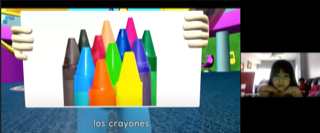Learning, whether in-person or virtual, is most successful when students are active and engaged. The transition to e-learning has made student engagement in learning particularly difficult. But at Christopher House, our unique model of personalized education for students, coupled with immersive supports for the entire family, is showing success, with a remarkable 95% average daily attendance during remote learning.
The main ingredient in our success is our unique continuum of care model. It includes personalized education for scholars along with immersive supports for the entire family; such as: individual, family, and crisis counseling; family advocates who act as year-round case workers; parent, child, and youth support groups; doula services for expectant mothers; and parent school programs. These services allow Christopher House to uplift our scholars and their families, helping them build stable, nurturing home environments which ultimately enable them to succeed.
Here’s how this model helps keep our scholars learning during the pandemic. Our teachers and advocates work closely together to remain in contact with families, help create schedules, and more. When necessary, staff have gone the extra step to make daily morning “wake up calls” to students in order to ensure that they are in front of their computers and ready to go at the start of the remote day. It’s these types of personal efforts that have had a huge hand in our strong attendance rate during this incredibly difficult time.
We’re Learning from Experience
When we initially transitioned–extremely abruptly–to remote learning, we set out to find the best ways to build experiences that would keep students engaged in the virtual classroom. This started in March by ensuring that every scholar had access to technology, internet, and personalized lesson plans. But then, we went further.
With what we learned from our spring semester, we spent August adapting curricular units to ensure e-learning would be meaningful and appropriately scaffolded. For example, teachers planned lessons to use small group sessions more frequently than whole class instruction. Greater use of small groups ensured our students received differentiated, targeted instruction, while addressing learning loss head-on.
We also provided our teachers with additional planning and prep time to research and make adjustments for remote learning. They received personalized G Suite and online application trainings. They also were supported in creating their Bitmoji classrooms, a platform they use daily that allows scholars to create their own avatars and keeps them engaged in lessons.
Based on the events of the summer, we held two sessions for teachers on diversity, equity, and inclusion. We also offered guidance on how to incorporate social justice standards into their units throughout the school year.
We’ve made sure that personalized learning remains a vital component of our success. Over the last month, our teachers conducted one-on-one reading assessments with each scholar in kindergarten through fifth grade, to appropriately place and instruct them in small reading groups. Teachers and support staff met with students individually during independent work time to get the job done efficiently, without loss of whole-class time.
Meanwhile, our middle school teachers created their own assessment strategy, based on the Common Core State Standards, to effectively instruct six different flexible, multi-grade groups of middle school scholars. We have ensured that scholars receive the assessment they need to succeed: standards-based progress reports that separate feedback on work habits from tracking academic mastery.
We’re Supporting All Learners
My school proudly serves substantial numbers of English learners as well as “diverse learners,” the Chicago Public Schools’ term for students who receive special education services. Virtual learning can be a challenge for both these groups of scholars, and our staff continues to provide individualized support to keep them engaged in the curriculum.
During this time, our teachers have really gone above and beyond to meet their scholars’ needs–even including offering instructional time outside of regular school hours. With 35% of our 500 scholars currently qualifying for English Language Learner services, our ELL teaching team provides native language support through specialty visuals and vocabulary prompts. They also hold meetings with these students in smaller sessions.
Meanwhile, our Diverse Learning team, which directly serves 15% of our scholars, co-teaches in six leveled virtual middle school classrooms. Students are assigned to these classrooms based on assessment results from the previous year. Through co-teaching, our diverse learner teachers work alongside general education teachers within the same classroom to ensure our scholars’ varying needs are met. We also employ seven dedicated paraprofessionals who support students throughout the entire school day, during live lessons and independent work sessions.
We’re Connecting Beyond Academics
Beyond the classroom, we’ve kept our scholars active by continuing extracurriculars. We have over a dozen staff members leading after-school sessions for sports and clubs including cheerleading, chess, and soccer. We’ve amplified our music program beyond our regular classroom, providing students with access to videos of performances from their music teacher. Just as they’ve always done in person, scholars continue to choose from a variety of electives, including school news broadcasting and production, art workshop, and computer coding.
Over the coming months, we will continue meeting virtually to fine-tune our staff-created virtual code of conduct, hold parent orientations, and determine if scholars are in the right learning groups. For us, virtual learning isn’t an excuse to compromise quality; it’s an opportunity to live up to high expectations and lead with compassion.
Krissy Novy
Latest posts by Krissy Novy (see all)
- Here’s How Christopher House Continues to Refine Remote Learning - October 22, 2020
- By Serving the Whole Family, Christopher House Made Distance Learning Work for All Kids - September 16, 2020
